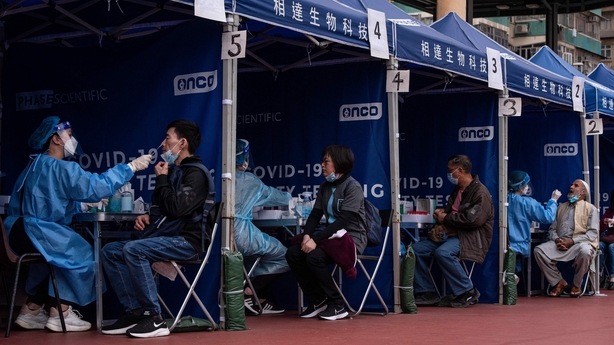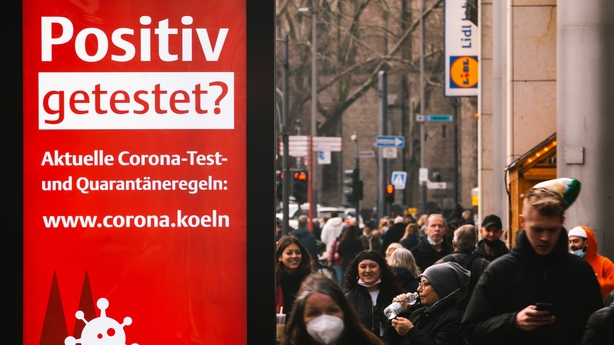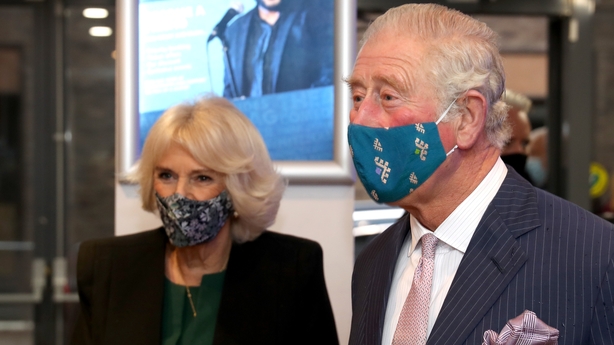Sweden's Health Agency has recommended that people aged 80 or above should receive a second booster shot of Covid-19 vaccine, the fourth jab in total, to ward off waning immunity amid the rampant spread of the Omicron variant.
The recommendation also covered all people living in nursing homes or who receive assisted living services at home.
The second booster shot should be administered at least four months after the first booster jab, the agency said in a statement.
Sweden hit record levels of infections earlier this year as Omicron spread rapidly across the country.
But authorities are banking on booster shots and the milder symptoms of the variant to ease the pressure on healthcare and removed restrictions and scaled back testing this month.
Infections remain pervasive and the Health Agency said a growing number of cases among groups at greater risk of serious disease, such as nursing home residents, had been recorded in recent weeks.
"A booster dose strengthens protection. Therefore we believe people 80 years or older will benefit from a second booster dose," Chief Epidemiologist Anders Tegnell said.
As with the first round of booster shots, the jabs should consist of Pfizer/Biontech or Moderna vaccines, the agency said.
Hong Kong leader says city 'overwhelmed' by Omicron wave
Hong Kong's health facilities have been overloaded by an "onslaught" of Covid-19 infections, its leader said, even as authorities cling to a "zero-Covid" policy despite an unprecedented rise in cases fuelled by the Omicron variant.
Authorities have adhered to mainland China's policy of stamping out the smallest outbreak with mass quarantine, widespread tracking, and prolonged social distancing measures since the start of the pandemic.
But the extremely contagious Omicron variant breached the Chinese territory's defences in late December, piling up more than 8,000 infections in a few weeks with researchers warning that daily cases could exceed 25,000 by next month.
While the infection rate remains low compared to major cities around the world, Hong Kong's policy of sending even asymptomatic cases to hospitals and quarantine facilities has filled up beds and amplified wait times.
"The onslaught of the fifth wave of the epidemic has dealt a heavy blow to Hong Kong and overwhelmed the city's capacity of handling," leader Carrie Lam said in a statement issued last night.
The surge in cases has increased wait times "for admitting people who test positive to isolation facilities," she added.

Surrounded by patients queuing for tests all of last week, the city's hospitals on Sunday told people who have "stable or have mild symptoms" to stay at home.
But Ms Lam said the government "will spare no effort to implement" the "zero Covid" strategy and that China will help the city to bolster testing and quarantine resources.
Hong Kong has struggled to persuade its elderly population to get vaccinated with only around 50% of people over the age of 70% a jab.
The government has repeatedly said its "zero Covid" policy is meant to buy more time for them to get inoculated.
Researchers warned on Friday that by the end of March, the city could be racking up 28,000 daily infections.
Hong Kong had only recorded a touch over 12,000 cases by the end of 2021.
Last week marked the city's first Covid-19 deaths in five months, with seven patients over 70 and one four-year-old boy dying due to the virus.
Authorities said two more elderly patients had died today, and the hospital occupation rate now at 90% - which is its limit.
In-person teaching in kindergartens, primary schools, and secondary schools - which have been closed since January - will remain suspended until early March, the city's Education Bureau said.
Germany to end most Covid curbs in March: draft govt plan
Germany will end most government restrictions to fight the coronavirus pandemic in March, according to a draft official plan seen by AFP, as new infections rates ease.
Two years after the start of the outbreak in Germany, curbs to prevent contagion will begin falling away.
As a first step, contact restrictions will ease allowing more to meet privately, while access to shops will be open to all without checks on whether the individuals are vaccinated or tested.
From 4 March, access to restaurants will be open to unvaccinated people too if they show a negative test.
In a final step, "broad restrictions of social, cultural and economic life should be gradually lifted by the start of spring on March 20, 2022," said the draft document to be approved by federal and state leaders on Wednesday.
After that date, Europe's top economy would rely on "basic protection measures" including "in particular the wearing of medical masks" in public.

Rules requiring employers to allow staff to work from home if possible would also be lifted at that time.
For several weeks, Germany has restricted access to bars and restaurants to people who have received a booster jab of the coronavirus vaccine or who are tested on top of being fully vaccinated or recovered.
Contact restrictions are also in place keeping private gatherings to 10 people, or two households if an unvaccinated person is present.
Chancellor Olaf Scholz is due to meet with leaders of Germany's 16 states on Wednesday to agree the next steps on dealing with the pandemic.
Germany reported 76,465 new Covid-19 infections over the last 24 hours and 42 deaths in the second week in a row to show falling rates.
Germany's states, which have significant autonomy in implementing restrictions from mask-wearing in public transport to home-schooling, have already begun to gradually ease curbs.
Camilla, wife of Britain's Prince Charles, tests positive for Covid
Camilla, the wife of Britain's Prince Charles, has tested positive for coronavirus.
"Her Royal Highness The Duchess of Cornwall has tested positive for Covid-19 and is self-isolating," Clarence House said in a statement.
"We continue to follow government guidelines."

Prince Charles, 73, tested positive for Covid-19 for a second time last week. Clarence House have not given an update on his condition and it did not give any further details about Camilla today.
The couple had been fully vaccinated against Covid-19, including a booster shot.
A royal source told Reuters last week that Prince Charles had met his mother Queen Elizabeth two days before his positive test.
The source said at the time that she was not displaying any symptoms, but the situation was being monitored.
Prince Charles previously tested positive for the virus in March 2020 when he said he had been "lucky" to have suffered only mild symptoms.
His son Prince William also contracted Covid shortly after his father in 2020.

